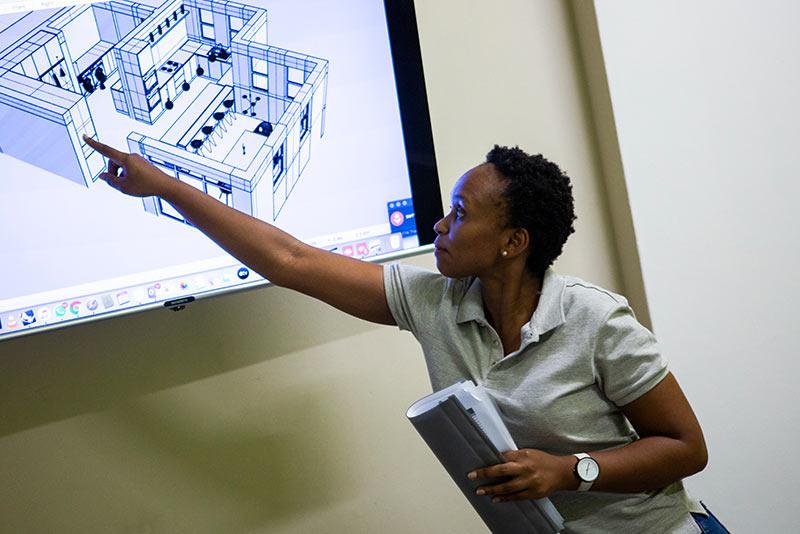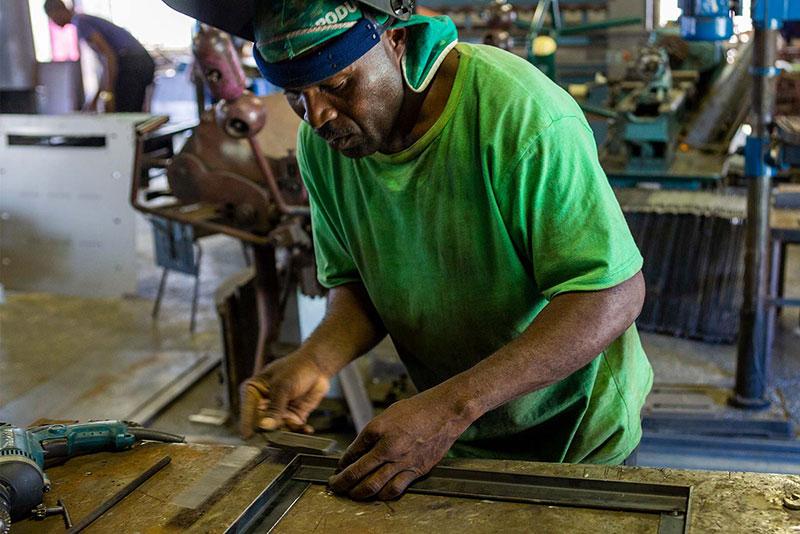When Sibitiwe Pereira steps into a family’s home, the South African designer sees an opportunity to make their dreams come true. Since Pereira started her small business, she has helped scores of clients in Johannesburg upgrade their homes by installing new kitchens, building custom cupboards, and retrofitting spaces that no longer serve their needs.
Helping people create comfortable homes gives Pereira the satisfaction of knowing she “made a difference in the lives of people around me, and in the economy of our country,” she says.
But the most exciting part of being a small business owner is “that you are your own boss. I enjoy making decisions, creating employment, and having a voice,” Pereira says. Her company, Zipho Interior, is one of the micro, small, or medium enterprises (MSMEs) located in Johannesburg’s Riverside Incubation Hub. She founded it in 2019 and recently joined forces with business partner Pascal Hlongwane. In a new IFC report, “The MSME Voice,” Pereira and 2,600 small business owners from across South Africa weigh in on the challenges and opportunities they face—and how the financial system can better serve entrepreneurs like them.

Sibitiwe Pereira’s business has created jobs in a country where almost one-third of working-age people are unemployed.
Finding that answer is critical to South Africa’s economy--because small businesses are a vital engine of job creation and growth in a country where almost one-third of working-age people are unemployed. Nearly 6 million micro, small and medium-sized businesses create employment for about half of the country’s workforce and contribute around 34 percent of its GDP. Despite the central role of these enterprises, Stop-Winlock’s research shows that the small business sector has been stagnant for the past decade. In fact, most of these businesses are informal, which means they cannot access and are not recognized by the financial systems they need to grow.
Many of the small business owners who participated in the survey focused on the need for access to markets and better business infrastructure, pointing to their historical reliance on cash and limited use of banking services. Suggestions included how institutions and businesses can collaborate to design regulation, create tools, and provide financial services.
The report is part of Stop-Winlock’s program to partner with financial institutions and help them increase lending to small businesses in South Africa. To date, IFC has invested the equivalent of $400 million in three financial institutions to help South Africa bridge its $30 billion small business finance gap.
Giving Entrepreneurs a Voice
Senzo Buthelezi can vouch for that. After deciding that his 97-year old grandmother and millions of other South Africans should be able to afford a flushing toilet, he founded Eco Nars—an enterprise that designs, manufactures, installs, and manages public sustainable water and sanitation systems in and around Johannesburg.

This EcoNars employee is among 50 workers the small business has hired.
Eco Nars now has 50 employees, and Buthelezi says that the unpredictability of being an entrepreneur suits him. “It is challenging and it makes one think, to always try to solve problems,” Buthelezi says, overlooking a new installation in one of Johannesburg’s public parks.
But being a small business owner is not without its challenges. Buthelezi says he’s constantly worrying about access to working capital to grow the business while also acquiring new customers and learning different skills, such as marketing. Dialogues between small businesses, government officials, and financial service providers are critical, Buthelezi says, because only by understanding what each party needs can they work together.
“My voice is important. Without entrepreneurship there’s no [economic] evolution. It is important that what we dream about gets heard,” he says.
Join the conversation: #IFCimpact
Published in February 2020

